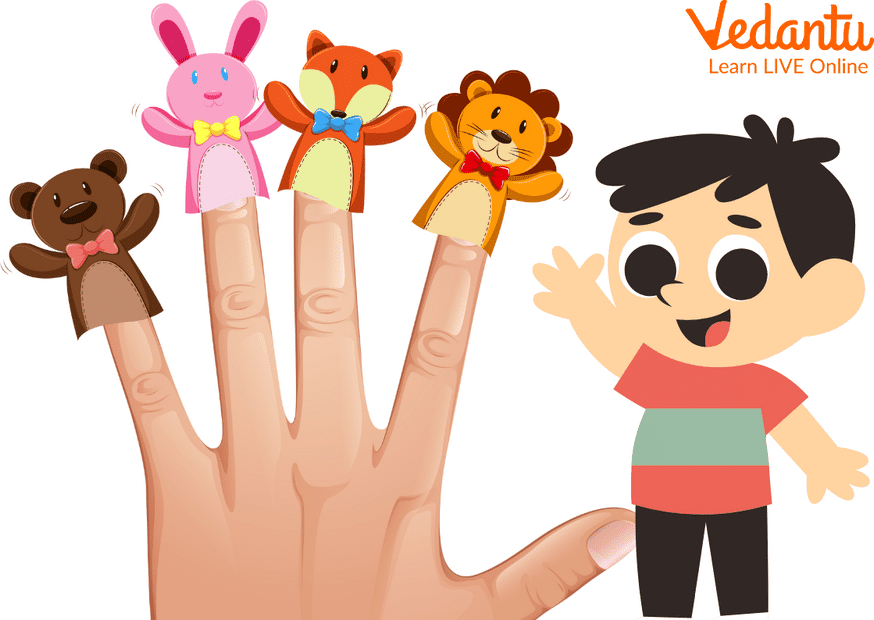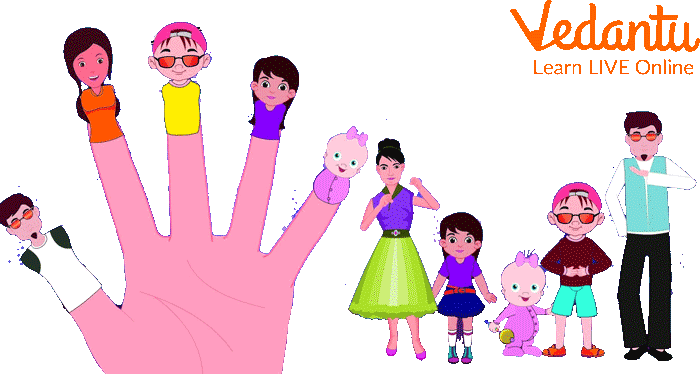Finger Family Animals Nursery Rhymes
Finger family is a popular way to introduce children to the names of their fingers, usually in the form of "this little finger says...(name)" and "so says this thumb" as they point to each finger. Pointing with more than one finger simultaneously is an alternative.

Five Fingers of the Hand
Nursery rhymes Finger Family is a song, typically for children, where the fingers are dragged from one fingertip to another and represent a letter. For example, "S" is made by pressing fingers together at a point between the thumb and forefinger and moving them anti-clockwise around it.
Nursery Rhyme Finger Family Lyrics
Daddy finger, daddy's finger, where are you?
Here I am, here I am. How do you do?
Mommy finger, Mommy's finger, where are you?
Here I am, here I am. How do you do?
Brother finger, Brother's finger, where are you?
Here I am, here I am. How do you do?
Sister finger, Sister's finger, where are you?
Here I am, here I am. How do you do?
Baby finger, Baby finger, where are you?
Here I am, here I am. How do you do?

Finger Family
Detailed Names and Roles of Fingers
The finger family is a special case of finger play, also makes it interesting for foodies by nursery rhymes lollipop finger family where children explore and investigate the shapes of their fingers, taking them into groups – fingers 1 to 5 may form one hand, while fingers 6 to 10 go together in another group. Each group has a name and a role.
1. Father's Finger
Thumb represents the father finger.
2. Mother's Finger
The index represents the mother finger.
3. Sister's Finger
The middle represents the sister finger.
4. Brother's Finger
The ring represents the brother finger.
5. Baby's Finger
Little represents a baby finger.
Also, this can be presented as spiderman finger family nursery rhymes.
Gestural Names and Meanings
6. Little Finger
Little represents the little fingers on both hands.
7. Middle Finger
The middle represents the middle finger.
8. Ring Finger
The ring represents the ring finger.
9. Bump Thumb
Thumb represents a bumped thumb.
10. Pinky Finger
Pinky represents the pinky finger (finger number 11). Baby and pinky fingers may overlap at the base of the thumb, the bump, or in the webbed part of the hand, giving a distinctive smile gesture that can be readily distinguished from other touch gestures such as a wave or high five (or garland).
Functions of Different Fingers

Fingers
1. Index Finger
The index represents the index finger. It may be used to point in different directions or to make a circle or the shape of an "M".
2. Middle Finger
The middle finger can be used similarly to the index finger, but it can also point upwards and downwards, as well as in each direction. It is also used to mimic certain sounds (e.g., the letter 's' or the sound of a frog croaking). This technique is known as 'in-betweening'.
3. Ring Finger
The ring finger can point upwards or in each direction. It is also used to mimic certain sounds (e.g., the letter 's' or the sound of a frog croaking). This technique is known as 'in-betweening'.
4. Pinky Finger
Pinky finger can point upwards, or in each direction and is also used for mimicry of sounds (e.g., the letter 's' or the sound of a frog croaking).
5. Thumb
The thumb can move in all directions, including horizontally. It is also used to make the shape of an "M", or to mimic certain sounds (e.g., the letter 's' or the sound of a frog croaking).
Summary
The finger family is a great way to teach children the names of their fingers with nursery rhymes, finger family lyrics and also the sounds they can make. It can be used as a point of reference to help children remember its order while counting (1 thumb, 2 forefingers, 3 middle fingers, and so on). It is also a good warm-up activity for children because it allows them to interact with each other. The more people join in, the more fun it becomes for all involved.


FAQs on Nursery Rhymes: Finger Family for Kids
1. How can we help our children learn finger names?
Children learn the names of their fingers by interacting with other people. Baby nursery rhymes finger family also attracts children and the more people join in, the more fun it becomes for all involved. A great way to help children learn the finger names is to pretend that your hand looks like a family with parents, siblings, and a baby, who can be taught the basic things you do every day (Eating, and sleeping).
2. How do I sing Finger Family Rhymes to my kid?
Start the rhyme and help them along with it, by gently pointing to the various body parts as you hold your fingers up. Many parents have found it particularly helpful to use the last line of each verse as a cue for where they need to be looking next. For example, you could say, "Baby Brother Finger…Where's Baby Brother Finger?" while holding the baby up so they can see his/her finger!
3. How does the finger family work?
The finger family works through a 'catch-and-keep' mechanic. We can also use interesting topics for children like finger family animals and nursery rhymes. If a child knows how to make a gesture with one of their fingers, like for example pointing with the index finger, another person can hold that gesture and say "this little finger says /s/". The child will remember when to make the gesture because it will look like they are saying /s/. On top of that, you can ask them to say "point /s/".
4. Why do we use family to learn the names of the fingers?
It is pretty easy to learn the names of fingers when you pretend that your hand looks like a family with parents, siblings, and a baby, who can be taught the basic things you do every day (begging, eating, and sleeping).
5. Who published the Finger Family Rhymes?
It was first published by Nina Cutler on her blog Tiny Tunes in 2006 and then made into a song by Carrie Underwood on her Pickler & Ben album.





